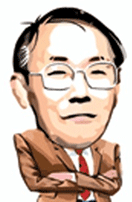“All the successive Presidents of the Republic of Korea have been had by the jaebeol tycoons.” So said former Prime Minister Chung Un-chan at a recent interview with Dong-A Ilbo.
He said: “Deceived by jaebeol are President Park Geun-ye and all her predecessors. In order to induce jaebeol to make investment the Presidents lifted restrictions. However, jaebeol made no investment. Former President Roh Moon-hyun was the most prominent President in terms of intention of controlling jaebeol. Ironically, however, he ended up a President who made jaebeol the strongest.”

Commoners and political laymen in Korea generally think that the country consists of 40% conservatives, 50% centrists, 8% liberals and 2% progressives.
The conservatives, represented by the ruling Saenuri Party, are mostly the rightists and stand for the government, while the centrists belong neither to the conservative Saenuri nor to the liberal New Politics Alliance for Democracy--still less to the progressive parties.
The centrists support whoever works for the interests of the common people, rebuke the greedy jaebeol and take no sides with the progressives whom they consider to be overly sympathetic with North Korea, if not downright pro-Kim Jong-Un.
Rep. Ahn Cheol-soo had the largest support of the middle-of-the-roaders during the last Presidential election campaign--prevailing over the then Saenuri Presidential Candidate Paek Geun-hye in opinion polls, who, however, defeated the then main opposition Democratic Unification Party (DUP) Candidate Moon Jae-in. Naturally, Ahn could have won the Presidential election as an opposition candidate but for Moon who through politicking literally forced Ahn to give up candidacy as Ahn did not have any supporters in the DUP.
Why was Ahn popular? He took sides with the common people, and ridiculed jaebeol, saying that jaebeol tycoons kept SMEs (small-medium enterprises) in a zoo cage, and fed on their blood.
In the next Presidential election, in this context, whoever succeeds in convincing the people, the common people, that he/she can ‘contain’ jaebeol will have a good chance of winning the support of the people, like Ahn.
Chung Un-chan could make a ‘successful Ahn’ though he was a prime minister of former President Lee Myung-bak who is now rapidly losing popularity among people due to the alleged wasting of 100 trillion won (US$92 billion) in overseas resources development, four-river and defense industry projects.
Chung was one of the best-liked economics students of noted economics professor of Seoul National University, Cho Soon (former Seoul mayor and deputy prime minister).
It is not clear if Chung takes interest in the next Presidential election as a candidate of Saenuri, NPAD or as an independent. However, if he does, he stands a good chance of gaining public support if he continues to stand for the interests of the common people against jaebeol and the class of the haves.
Chung said: “Literally, there is no country in the world where the economy grows reliant on big businesses (jaebeol) like in Korea. In Japan, the big businesses are very active but they have a healthy relationship of growth with the SMEs. In Taiwan, the SMEs play a central role and the economy is in no way affected even if one or two big businesses go bankrupt. The situation is very different in Korea. If one or two jaebeol businesses have a problem, it affects the entire economy of the country.”
Chung headed the Korea Commission for Corporate Partnership (2010-2012) which is designed to promote the win-win partnership between the big businesses and the SMEs.
The way Chung appeals to the people is reminiscent of what Ahn did. Ahn is almost fading away from the memory of the people.
If Chung does not repeat the mistakes of Ahn, he stands a good chance of

